A Quaker Murder Mystery Writer Gets Cozy With Crime
Quaker author Edith Maxwell is a best-selling mystery writer with more than 30 novels in publication. She says it’s her series about a young Quaker midwife solving murders and delivering babies that is closest to her heart.
In this episode, Edith shares her journey from earning a PhD in linguistics to a career in fiction and how it connects with her Quaker faith.
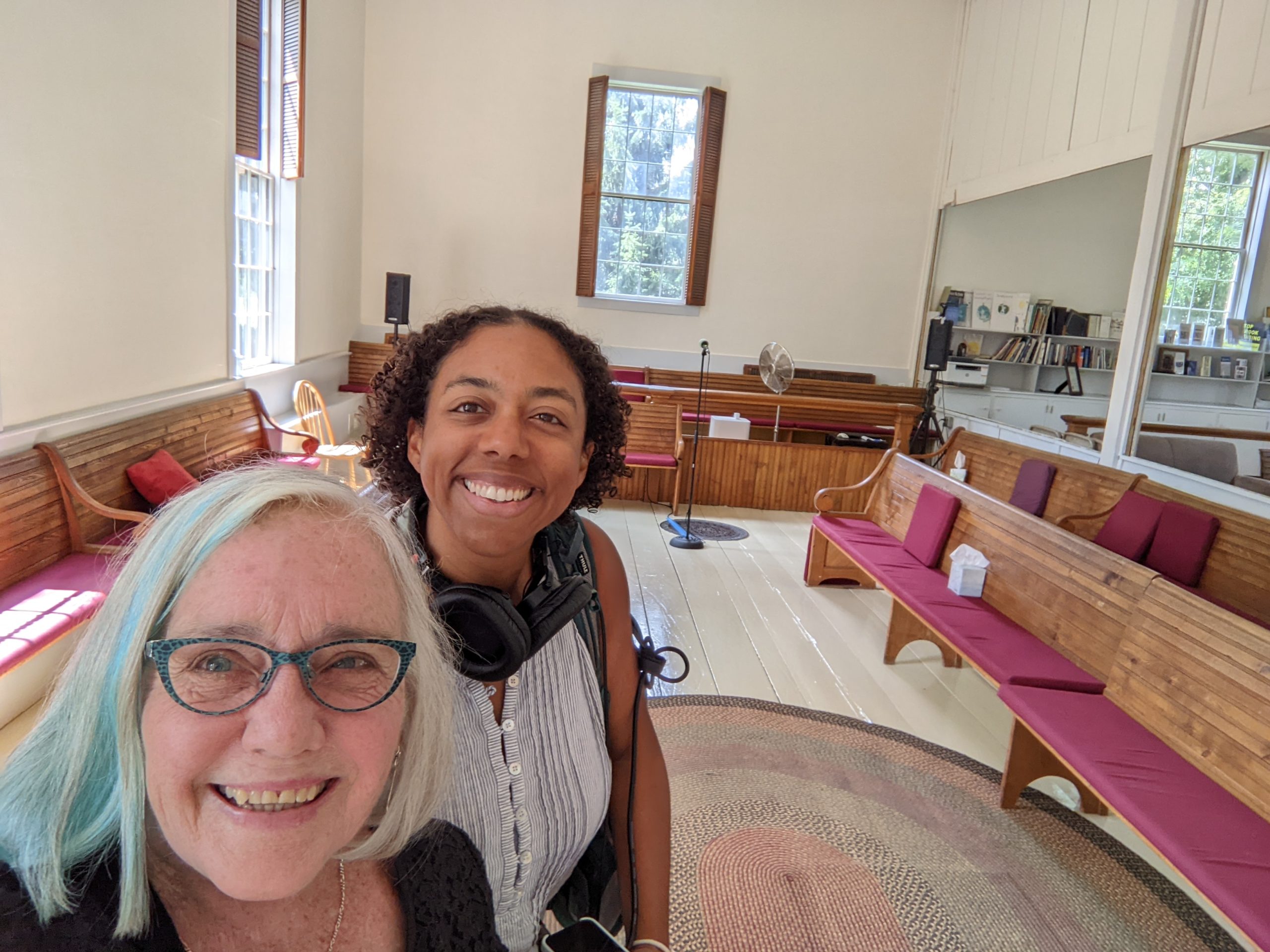
Subscribe so you don’t miss an episode!
After you listen, tell us what you thought of this episode in the comments below! And check out our discussion questions over on the Transcript tab.
Download the transcript and discussion questions.
Discussion Questions
- Do you see a connection in giving vocal ministry and expressing creativity? How does the act of creating evoke a spiritual response in you?
- Stories have the power to introduce us to new thoughts, ideas, cultures, etc — what is a story (fiction or nonfiction) that has stayed with you? What about that story resonates with you?
Emily Earle
Suddenly I knew who the Firebug was. I had to tell Detective Donovan, I risked disapprobation by leaving meeting early center was worth it. I rose and made my way to the door, wincing as I broke the silence by catching my boob toe on the edge of a bench and nearly tripping. As I passed the corner of the building, I bumped into Stephen Farley. I looked at him with alarm. What is the I began, he spun, running to the back of the meetinghouse. I picked up my skirts and followed at a trot. He disappeared. When I turned the corner, I halted. Fire flared up from a pile of burning leaves. It licked at the back wall of the building. Steven stood watching it with an intense stare, rubbing his hands. I rushed to the pile. I stamped at it, but it had already begun to eat at the wood above. Fire. Get out. I screamed, fire bring buckets. I heard a shriek from within coughing from the smoke. I threw my cloak onto the burning leaves but the fire was too large to smother. I beat that the burning wall with my hands. I wouldn’t let my beloved meetinghouse fall victim to Stevens warped mind
Various
Thee Quaker Podcast: Story, spirit, sound
Georgia Sparling
I’m Georgia Sparling.
Jon Watts
And I’m Jon Watts.
Georgia Sparling
And our guest today is a woman of mystery.
Jon Watts
Do tell.
Georgia Sparling
Well, she goes by two names: Edith Maxwell and Maddie Day.
Jon Watts
Oh, so a spy?
Georgia Sparling
No.
Jon Watts
Witness Protection?
Georgia Sparling
Also no.
Jon Watts
Ok, I give up.
Georgia Sparling
A Quaker mystery writer… with a pen name.
Jon Watts
Oh, very, very fun. Cool.
Georgia Sparling
Can’t believe you didn’t guess that. So her real name is Edith Maxwell. But first, tell me what your relationship is to mysteries.
Jon Watts
Oh, I I wouldn’t say I have much of one. I’ve enjoy a mystery or two, but I’m I’m more of a sci-fi reader I think. What what about you?
Georgia Sparling
I love a good mystery. I’m reading a couple right now. It’s really the build up that I love and uncovering the clues even more than the ending. You know, it’s about the journey for me.
Jon Watts
Awesome. Well, it sounds like you’re the right person for the for the job. Then tell me more about Edith or Maddie’s books.
Georgia Sparling
Well, you just heard an excerpt from one of her recent books is a collection of short stories called “A Questionable Death.” And Edith writes very non gory mysteries, aka cozy mysteries, which I’ll explain that term later in the episode. But she’s a prolific author, a best-selling, award winning author actually, and she writes Quakerism into her books in more ways than one. Oh, that that sounds really intriguing. Yes, as with any good mystery, so let’s get started. Hi, I’m Georgia.
Edith Maxwell
My name is Edith Maxwell, and I’m a over a 30-year member of Amesbury Friends Meeting in the northeast corner of Massachusetts. I am a full-time mystery fiction author when I’m not sitting in meeting for worship.
Georgia Sparling
I meet Edith at the Amesbury Meetinghouse, which is an hour or so north of Boston. She’s on the short side, very friendly with a delightfully spunky streak of blue in her short gray hair. Edith lives close to the meetinghouse and has arrived a few minutes before me. Like many a New England meeting. This one is historic, with wide whitewashed plank floors and a modest worship area. It’s the perfect place to meet since it features prominently in Edith’s Quaker midwife mystery series.
Edith Maxwell
It’s the most beautiful, simple, light filled place of worship. And I mean that directly. I mean, I feel that the walls are imbued with spirit from centuries of Friends sitting and unprogrammed worship there.
Georgia Sparling
Edith was born and raised in California. She says she was nominally Presbyterian growing up. It was while she was earning a PhD in linguistics that she visited her first Quaker meeting.
Edith Maxwell
I mean, I heard about Quakers and the anti war in the Vietnam era. Personally, it wasn’t until I went with a boyfriend when I was in graduate school in Bloomington, Indiana. And I went to the meeting there, which is an unprogrammed meeting at the time. In the early 1980s. It was just thriving, lots of kids, lots of families, and I thought, oh, I can I couldn’t relate to this. Like I really, really liked it.
Georgia Sparling
It wasn’t until years later, after getting married, having two kids, becoming a stay-at-home mom and moving to a town north of Boston, that she became a regular part of a meeting.
Edith Maxwell
And I was just seized with this need to find the Quaker meeting near me. This was in 1989. And there was no internet and we didn’t even have a phonebook yet at home. So I went down to the local market in West Newbury and I said, can I borrow your phonebook, and the Quaker meeting didn’t even have a phone number at the time, but I think I saw it notice in the newspaper, the local newspaper, and I was there the next week.
Georgia Sparling
But let’s back up. When Edith started attending Amesbury Meeting, she wasn’t a mystery writer yet, but she was a writer.
Edith Maxwell
I wrote a lot of fiction as a child, like almost obsessively, I was just writing stories all the time from from when I could write, I don’t know, first grade or something. There was a competition, a contest in the Pasadena Star News, and there was a children’s fiction contest. And I won for the “Viking Girl”. It was a little short story, and they paid me $2. And they printed my story. And so that was my first paid fiction. And then I I kind of left that left fiction behind it did journalism and academic writing and different kinds of writing. When my youngest son John went off to kindergarten. And I had every morning to myself that I started writing a murder mystery.
Georgia Sparling
Edith’s husband at the time suggested it.
Edith Maxwell
He said, well, you like reading mysteries so much why don’t you write one? And you know, hilariously, I think he thought we would just make a lot of money at this real quick. I am making money now. But that took a long, long time.
Georgia Sparling
Edith ran a small organic farm. And she started writing in the offseason.
Edith Maxwell
I just thought, well, I love reading mysteries with female protagonists. And I can write one. So I started writing one and I joined a writing critique group. But that was, it took me some decades to get back to writing.
Georgia Sparling
Farming season kicked up again. And the book went into a metaphorical drawer.
Edith Maxwell
I’m not a plotter. So I hadn’t, I didn’t know how it was going to end. Because that’s how I write I follow my characters around, I write down what they do. And I had no idea how it was going to enter that he didn’t have enough skills, writing skills to understand how to figure out how it should end. So I kind of put it down and I farmed, and then the next year, I got back into the paid workforce. And I retrained as a technical writer, and I couldn’t figure out how to find enough time being working full time racing to elementary school children. And at the time, my marriage was not going that well. And so I had a cantankerous husband to deal with. And I just couldn’t figure out how to also carry an entire plot of the book, and its characters and all that in my head. So I saved that file. And it wasn’t until oh, nearly 15 or so years later that that I got back to it. And it ended up being my second published novel A Tine To Live a Tine to Die. T-I-N-E, which was the first of my local foods mysteries, which was set on an organic farm. So I did get back to it like never, you never throw away anything you’ve written. You just save it and see how you can repurpose it.
Georgia Sparling
Edith was an avid mystery reader. She loved authors like Sue Grafton and Sara Paretsky. And unlike male authors, she read these female writers didn’t describe women’s bodies in intimate and perhaps unnecessary detail.
Edith Maxwell
You know, I’ve been reading crime fiction by men and all my life sort of, but they tend to mention women’s boobs and legs. A lot of the women who write don’t do that. You know, I don’t need to hear about that. I mean, why? It’s just it just seemed gratuitous to me. And so that’s why I was reading those women. And so of course, that’s how I write too.
Georgia Sparling
So Edith began writing cozy mysteries. If you don’t know cozy mysteries are a thing. A big thing in the book world, millions of copies sell every year. And this mystery sub genre follows a certain set of rules. One, the protagonist is almost always a woman in a small town or village.
Edith Maxwell
That female sleuth who’s a real person who’s not it isn’t her job to solve the crime. She said she’s a caterer or she says the wife of a minister or she has a bike shop.
Georgia Sparling
Two, at least one person is murdered, but there’s no gore on the page, little to no foul language, and no explicit sex scenes.
Edith Maxwell
You might read well, he left out us as a list of swear words that would have made a sailor blush or, you know, she cursed, but you don’t read the actual words. And there’s romance, but they close the bedroom door before it gets too exciting.
Georgia Sparling
Three, a satisfying ending.
Edith Maxwell
The protagonist usually gets in some, you know, some peril toward the end, but she saves herself. Right? She doesn’t need anybody else to rescue her. And kind of the most important thing is that justice is restored to the community in the end, and you don’t feel worse about the world when you finish that book. And seriously, especially in the last few years, with pandemic was locked down with all of it. And certain political things that are happening, like the world out there is scary and messy enough. It was a huge respite to me to write these kinds of books during the pandemic, because it’s the only thing I can control.
Georgia Sparling
There is another characteristic of many cozy mysteries. One that I love — the punny titles. Edith has written more than 30 books, many of them award winners and bestsellers, and she has plenty of wordplay in her titles. There’s “Four Leaf Cleaver,” “Murder Uncorked,” that one takes place in California wine country, “Biscuits and Slashed Browns,” and “Mulch Ado About Murder.” Anyway, you get the idea. So when Edith did get back to creative writing, she stuck to her favorite genre and a topic close to her heart.
Edith Maxwell
My first published book came out in September 2012. And it was called “Speaking of Murder,” and it featured a contemporary Quaker linguistics professor in a coastal Massachusetts town, a fictional town, and she’s a professor and there’s a murder on campus of one of her students, and she gets drawn into solving it.
Georgia Sparling
That book had a sequel — “Murder on the Bluffs.” And since then, she’s gone on to write under her own name, as well as a pseudonym Maddie Day, and she has a series of series, there’s the Local Foods Mysteries set around an organic farm, the Country Store Mysteries set in Southwick, Indiana, the CC Barton Mysteries about a wine bar manager in a fictional California wine country town, the Cozy Capers Book Group mysteries set on Cape Cod, and a historical series featuring a spunky Quaker midwife. After the break, we meet that crime solving Quaker and find out how right connects with Edith Quaker faith.
Cassie Hardee
This is Cassie
Jon Watts
Hey, Cassie. It’s Jon Watts. How are you? Hi. Hi, could you give us a quick introduction and tell us a little bit about your spiritual background?
Cassie Hardee
Yeah. My name is Cassie. I use she/they pronouns? I grew up in an evangelical Christian family in small town Texas. Unfortunately, with a lot of that mainstream religion comes in conditional love, as I call it. I had always been since since college, kind of the trying to find a spiritual place where I could be 100% me. I didn’t know that there was Quakers still. You know, growing up in small town in Texas, Quakers are on the oatmeal box. And that’s it. And I was like, wait a second. There’s actually stuff here. There’s actually stuff in Dallas or stuff in Fort Worth? Like there’s actually Friends that meet? Before I went, I was like, Hey, I’m, I’m queer. Just, you know, can I be in, can I be in your space was pretty much what my initial email was, was like, can I be a queer, queer Quaker? Is this a thing? Like, can I do this?
And you know, without missing a beat, they’re like, of course, yeah, sure. You know, we don’t have any liturgy or a pastor or, like, come as you are 100%. And so already feeling welcome in that space. And then being able to sit there and actually feel something. There’s a power when you’re sitting with people that are all theirs, seeking their, you know, seeking something beyond them and inviting something beyond them in that space, was very, very powerful. So that’s where the tears came from, was for the first time. I actually could feel the presence of the Holy Spirit. Among among that Quaker community.
It was incredible because I’m still, you know, relatively new to attending a meeting. So it’s been a little over a year now. I’m still in the honeymoon phase, as I like to call it. So I’m still very excited. I want to learn and, and so, you know, because I have a commute, I have quite a commute right now, I have a lot of time on my hands. And so I’ll listen to history podcast, one of the things I when I found Thee Quaker Podcast, it was very much if I still want to learn more, so it was more just me, looking me seeking needs, trying to find more ways that I could learn not just about the history of Quakerism, but also seeing how people in 2023 You know, how that’s alive and, and powerful in today’s world.
Jon Watts
So, thank you so much for sharing your story with us, Cassie. We are working hard to make sure that when folks like Cassie are seeking ways to learn more about the Quaker faith, there’s something spiritually rich out there for them to find. And we couldn’t do it without your help. Thee Quaker Podcast is listener supported. So if you’re listening right now, whether you’re in your honeymoon phase, or even maybe a little past it, we are asking for your help. Help us to continue producing this show and you’ll be helping the future of Friends. Go to TheeQuaker.org To find out how that’s TheeQuaker.org. Thanks so much.
Emily Earle
I heard the snick of the key turning in the lock behind me as I made my way to the bedroom in the rear of the flat. I craned my head back. “Why does thee lock the door? We won’t be long, I’m sure” He took a long stride toward me. My answer was his suddenly glowering expression and his hands on my shoulders, pushing me down the shall ahead of him. “What is thee doing? Don’t push me,” I cried as I extended my arms before me to avoid crashing into the closed bedroom door. A muffled sound came from behind it. “Open the door,” he growled. Something cold the size of a thumb pressed into my back. It echoed the cold now spreading through me. This was no visit to sort baby clothes.
Georgia Sparling
Welcome back. You just heard an excerpt from the first book in Edith Maxwell’s Quaker midwife series, “Delivering the Truth.” Hopefully it piqued your interest! Set in Amesbury, Massachusetts in the 19th century, the books focus on Rose Carroll, a curious young woman who uses her career as a midwife to solve murders.
Edith Maxwell
Those are sort of the books closest to my heart because I live here and actually Rose lives in my house.
Georgia Sparling
In the series, Rose lives with family in a house that’s modeled after Edith’s own home in Amesbury. The first book, “Delivering the Truth” was inspired by the Great Fire of 1888. In the book, Rose becomes an amateur sleuth after a mysterious and catastrophic factory fire leaves several people dead. Along the way, she consults with John Greenleaf Whittier, who was a real Quaker poet, an abolitionist who was also actually on the building committee for the Amesbury Meetinghouse. Throughout the seven books in the Quaker midwife series, Rose becomes an increasingly adept sleuth, even as she introduces Edith’s readers to Quakerism.
Edith Maxwell
She’s an outsider to town, which is good for an amateur sleuth, because she can go around and ask questions. She doesn’t know everything. She didn’t grow up here. Quakers have always been outsiders, right? Plain dress, kind of weird speech, that makes her an outsider and she has her own business and she goes places the police can’t go. Right? They do not go into women’s bedrooms and ask them questions, especially when they’re in labor or nursing their babies.
Georgia Sparling
Rose is a faithful Quaker who tries to live by the principles of Friends. For example, whether a patient is a married wealthy woman or an unmarried mother to be, she treats them all with integrity. Rose also wears mostly plain colors. She uses the when talking to people and addresses everyone by their first name instead of using honorifics. I wanted to share one paragraph from delivering the truth that I thought was really amusing and also very telling of roses character. I won’t give anything away. But in this scene, Rose is talking with Detective Kevin Donovan, after a murder weapon has been found. And they’re having a bit of a standoff.
Emily Earle
Kevin regarding me, sat in silence as well. I’d read of this tactic in a serial novel. The silent treatment was usually effective to prod guilty parties to talk but I was a Quaker. I’d had a lifetime of sitting in silence.
Edith Maxwell
I have had so many people say I’ve learned so much about Quakers since from you about about being a Quaker from your books, which is heartening, like people really have have appreciated that. Yeah, I think there’s just so many people who know nothing about what those values are that we we hold dear, of non violence. So integrity of equality.
Georgia Sparling
And it turns out that Rose’s faith and her profession make her a great sleuth.
Edith Maxwell
If you ran across a dead body out in your sidewalk, you’d go, Oh, my God, and back away and throw up and call 911. You know, you don’t go, Oh, I wonder were they poisoned where they stand like, you don’t get involved. But But rose gets involved and she’s just she’s naturally inquisitive. She has that sort of fairly valuable, quiet personality of midwife, which you sort of need to have, if you hang around laboring women, you know, they’re going through a lot, you need to be a strong, quiet presence, and being a Quaker help sent to so she has a really, really strong morals really strong integrity. But she does not hold back from asking difficult questions.
Georgia Sparling
How do you feel like writing connects to your Quakerism?
Edith Maxwell
I mean, in part, what I do is my job. And sometimes it’s just hard work. And I show up every morning at seven that my laptop here. But there are times that I, I don’t quite want to say it’s worshipful. But there are times when I feel like I am my characters are speaking to me and I’m just typing what they what they’re telling me. Like it’s, it’s it’s otherworldly, and spiritual almost to it, when that happens that it doesn’t always happen. But that’s sort of the magic and the, if I sit with it, if I’m quiet, there’s analog slip, maybe that’s a better it’s sort of an analog to unprogrammed worship and being a Quaker in that, if I’m quiet, and I discern, I let myself have this be open to discerning what direction it goes, then did my characters will lead me along.
But if I’m over planned and over busy and thinking about it too much, it doesn’t work as well. Sometimes I feel like it’s my words, and my characters actions are coming from outside of me. It’s very nebulous. Like, I don’t want to say it, channeling God when I’m writing exactly, but there’s something kind of it’s connected to that. And, and I don’t understand that, and I don’t need to understand it. Similarly to when I’m in meeting for worship, I don’t, I don’t need to understand it, I don’t need to have a, an image or a name for, for that sense of spirit. And I don’t need to know I don’t need to call it my muse or my, you know, any particular thing but, but it’s definitely a feeling that that this, this creativity that I that I experience, is is bigger than me. And I and I’ve been able to tap into it, which is absolutely delightful.
Georgia Sparling
Yeah. Like, is there a similarity between vocal ministry? Or how it feels to give vocal ministry and how it’s how you experienced that magic of writing?
Edith Maxwell
I guess that’s I guess that’s connected. Yeah. Right, waiting, waiting for the right words, waiting for words to arise. And not needing always even to say them if they do arise that sitting with them. And yeah, yeah, I guess there’s a connection there.
Georgia Sparling
Edith also features a diverse set of characters in her books, which is very informed by her experiences as a Quaker.
Edith Maxwell
Try to include a kind of the spectrum of real people that are in real life, in terms of where they come from, and what they look like and what their jobs are in their ethnicities, their skin color, all of that their preferences, their relationships. Because that’s what real life is like. And I, this is for a podcast, so you can’t see me but I’m an old white lady. You know, and I how boring would that be if all I wrote about was old white ladies? Or a young white lady, like that’s just boring. So I really do try to I think all my books have at least one gay couple. And there’s just a variety but I also love having that older character.
Georgia Sparling
Edith’s books have a dedicated following. Plus, she’s been up for numerous awards.
Edith Maxwell
Five of the seven books were for nominated for an Agatha Award for Best Historical Novel. And that’s kind of like the Oscars in my field. And my fourth book, “Charity’s Burden,” actually won the Agatha. So I have an Agatha teapot on my bookshelf behind me in my office here. That’s the prize. That’s the award.
Georgia Sparling
Edith is a prolific writer. She spends three to four books a year plus short stories, plus regular posts on the Wicked Authors Blog, and she says she’s not likely to slow down much anytime soon. She finds ideas for new mysteries literally everywhere.
Edith Maxwell
Like a read just a little tweet from somebody a couple of months ago, who said he irons her money. I said you iron your money? Okay, who iron’s their money? Why do iron their money? What else are they obsessed about? And I wrote a note on my whiteboard. It’s up in front of my desk here. I just wrote “ironing money”. And now I have a short story half written about a woman who irons their money, and all the other things that so ideas like that can just be sparked by anything, anything. A news article, a person I see you walking down the street, anything at all.
Georgia Sparling
Thank you for listening, and thank you to Edith for sharing your stories with us. Edith wanted me to mention that she loves hearing from her readers and those who are interested in her books. You can find a list of all her titles, sign up for her newsletter and reach out to her via EdithMaxwell.com And do check out QuakerPodcast.com to tell us what you thought about this episode. You’ll also find a transcript and discussion questions plus a photo of Edith and I in the Amesbury Meetinghouse!
This episode was produced by me Georgia Sparling, and also Jon Watts. Jon also composed the music for this episode, Emily Earle was our voice actor. Mixing and mastering was provided by Studio D. Thee Quaker Podcast is part of Thee Quaker Project, a Quaker media organization with a focus on lifting up voices of spiritual courage and giving Quakers a platform in 21st Century Media. If you want to give to our work, we would so appreciate it, please consider becoming a monthly supporter. You can learn more about how to join our giving team at TheeQuaker.org. That’s theequaker.org. Every contribution expands our capacity to tell Quaker stories in a fresh way.
Before you go, I wanted to share another comment that we received on Apple Podcasts from user Frisch1. And that’s how I’m choosing to pronounce that. So it says, “Thoughtful podcasts — useful to both Friends and those wishing to learn more about Friends. I enjoy the mix of topics from historical to current issues faced by Friends meetings. I appreciate the way Georgia Sparling and Jon Watts present the challenges of following a leading the episodes have a good length, the sound quality is good. And the music supports the listening experience. I hope to use the episode on hybrid meetings as we continue to explore the use of Zoom technology in my meeting.” Thank you so much for leaving that comment.
And we’d love to hear more about how y’all are using these episodes. Are you engaging with the discussion questions, sharing them with your meeting with your social networks? Let us know. We’d also love your input on a future episode that I’m working on about Quakers and dating. So give us a call and tell us your experiences. Good weird, romantic, perplexing, frustrating, absolutely wonderful. We want to hear it all. So yeah, that’s Quakerism and dating. So here’s our number where you can leave a message to 215-278-9411. That’s 215-278-9411 And remember if there’s any links or phone numbers that we mentioned in episode that will also be in our episode notes at QuakerPodcast.com.
Alright, we’ll be back next week with a brand new episode.
Recorded and edited by Georgia Sparling and Jon Watts.
Original music by Jon Watts (Listen to more of Jon’s music here.)
Mixing and mastering by Studio D.
Supported by listeners like you (thank you!!)
Referenced in this episode:
- Learn all about Edith Maxwell, find a list of her book, and more on her website.
- Amesbury Meetinghouse
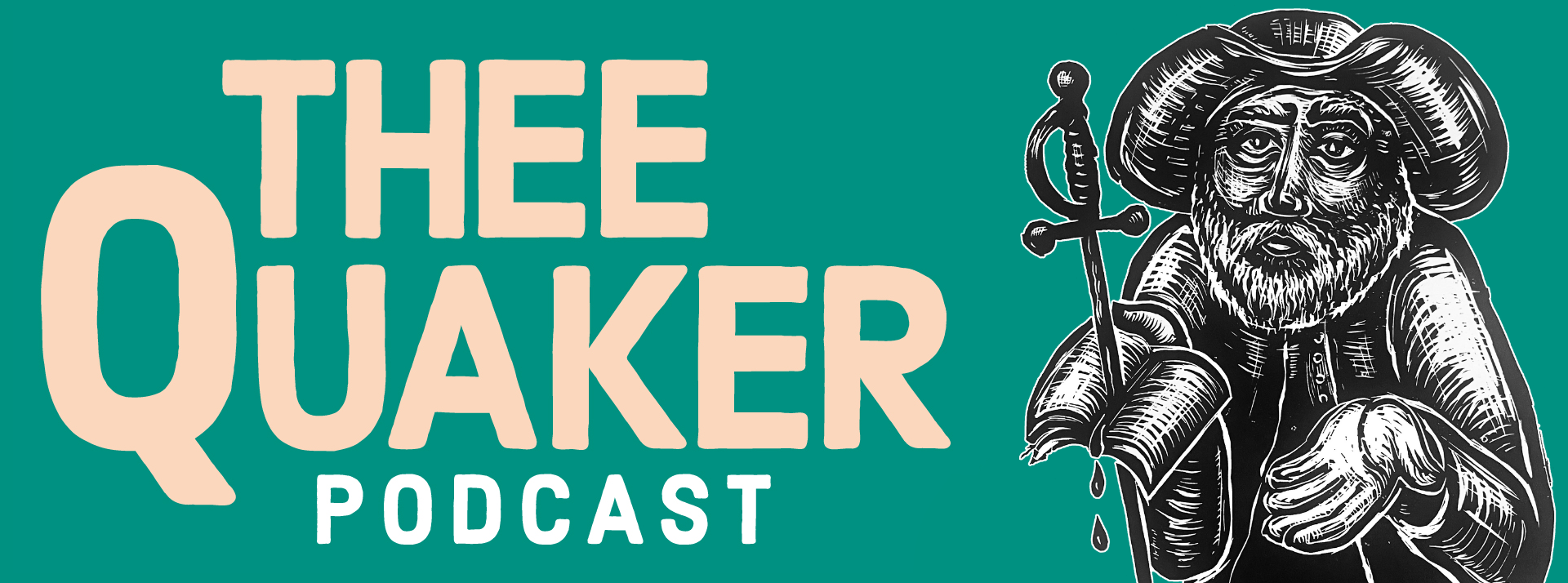

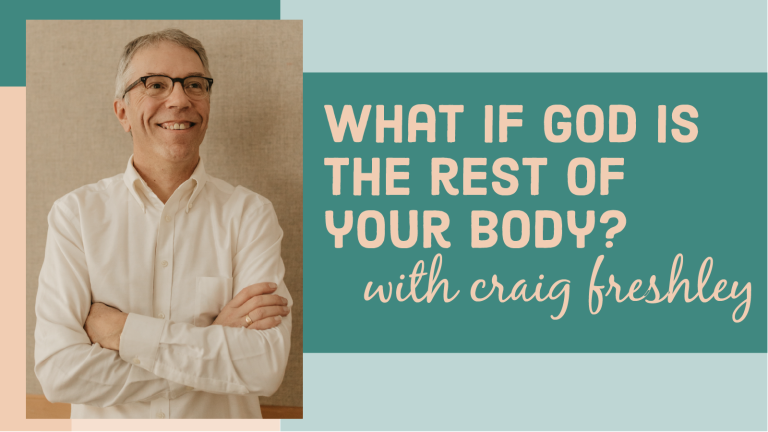
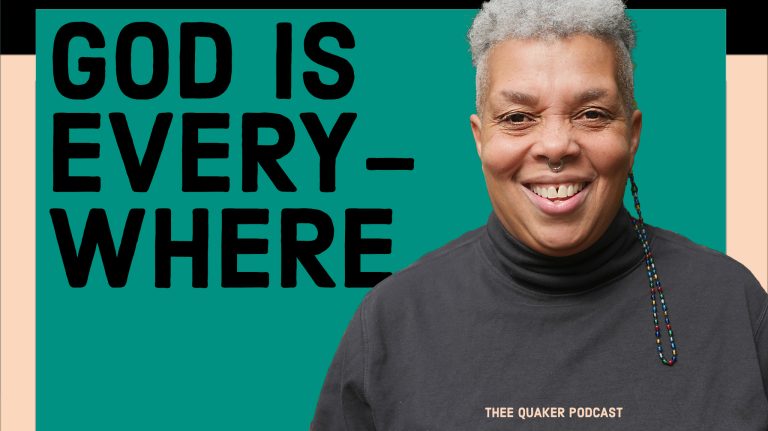
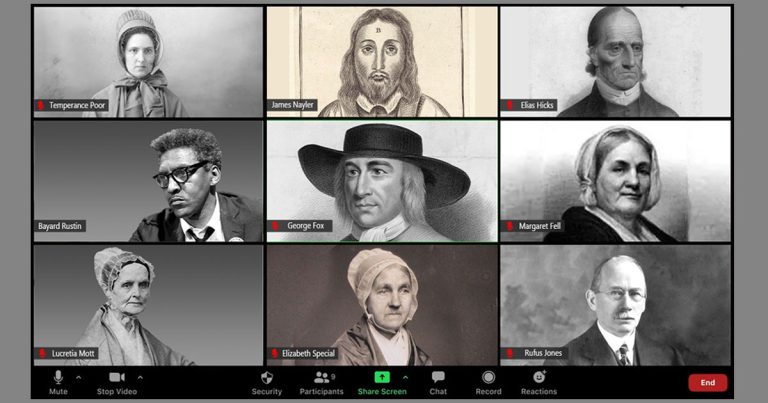
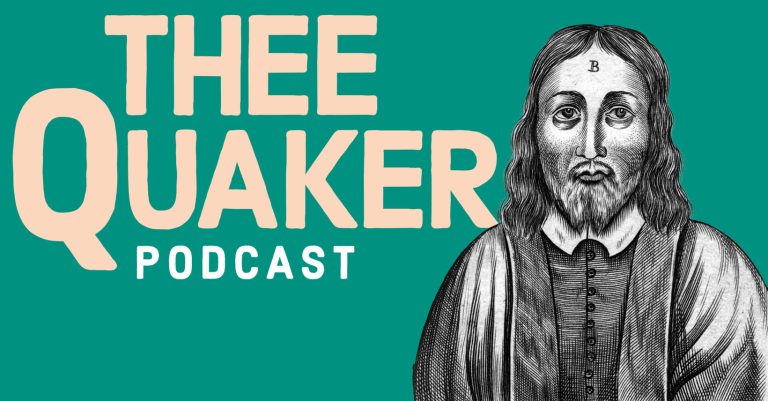
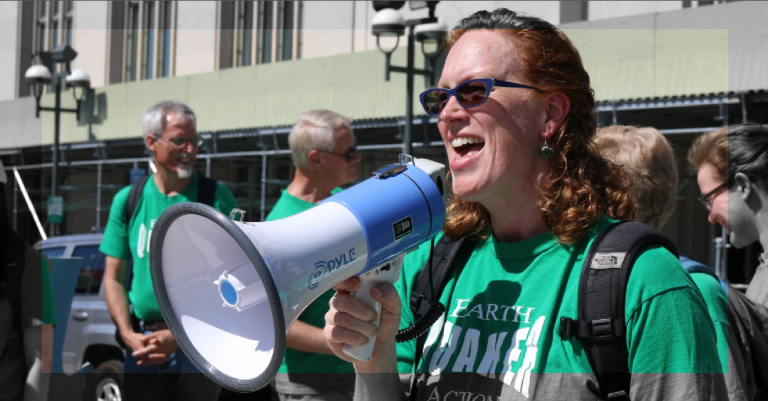
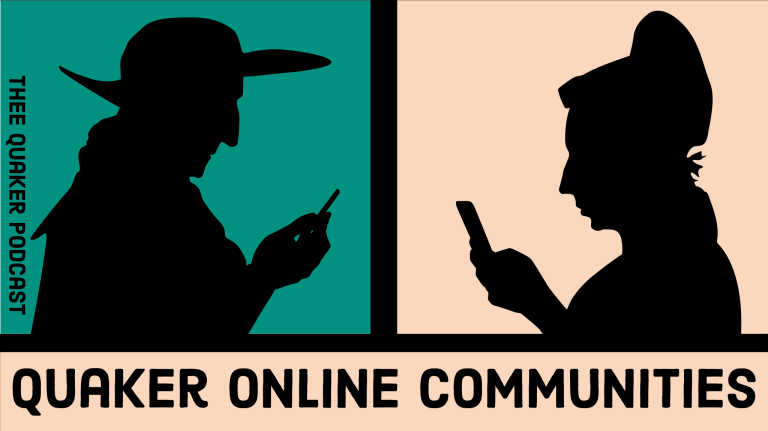
I love listening to eat the interview with Edith. She reviewed an historical Quaker Novel, The Kendal Sparrow, that I wrote and her blurb is predominantly on the back of it. Listening to the quality of the conversation. Gave me great hope that you might also interview with me for a podcast about my writing. TKS has gotten great ratings and reviews.
Thoroughly have enjoyed thee Quaker Podcast discussions with the Greensboro, North Carolina Meetings; the Quakers in Australia; the Quaker Mystery Writer, and Why are there so few African American Quakers. Truly terrific! I am a huge fan of Quaker contributions writ large and welcome any information that would introduce me to podcast remote voice work (reading lines, stories, narratives, commercials/advertisements) on Quaker projects.
Thank you.
Thank you for listening to the podcast! We haven’t done an episode yet on African American Quakers, but that is definitely an area we will cover in the future.
I am an African American Quaker and also a mystery writer. I look forward to your upcoming podcasts on Black Quakers.
Nice interview! I enjoy cozy mysteries as audiobooks because they are usually engaging and easy to follow while doing tasks like housework or driving. If any friends are of a similar mind, I found audiobooks under her pen name Maddie Day only. (The Edith Maxwell books maybe are not available in audio format? Unless I missed them.) Looking forward to checking out her work!
This was so interesting. TQ is a window into US Quakerism that the rest of the world’s Quakers can enjoy and learn from.